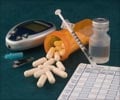Be Aware of the steps to take in case of diabetes
Understand diabetes and take control
The World Diabetes Day which falls on November 14th, 2009 embodies the theme "Diabetes Education and Prevention", which will pervade all through the campaign during 2009-2013. The initiatives sound a wake-up call to all those who can make a difference to diabetes.
For instance,
• People at the helm of affairs in healthcare and in the government need to improve strategies and policies for diabetes care and management.
• Victims must appreciate the power of knowledge about the condition which is the route to better management of the disease and avert its major complications.
• For the rest, it is to understand the risks and warning signs of diabetes to catch it early.
In effect, The World Diabetes Day will endeavor to spread greater awareness of the risk factors for diabetes and inspire best-practices in the prevention and treatment of diabetes.
Juvenile Diabetes or Type 1 Diabetes – Understanding the Condition
Juvenile diabetes or Type 1 Diabetes is an autoimmune disease that affects the functioning of beta cells. When this occurs, the pancreas fail to produce adequate insulin demanded by the body. A shortage of insulin leads to inadequate breakdown of sugars. This, in turn results in an accumulation of sugar in the blood stream leading to diabetes.
Improper diet, inadequate exercise, genetic factors and environment play a significant role in triggering the condition. The symptoms appear without an announcement and can often go unnoticed.
Watch Out For the Following Symptoms
• Increased urination
• Increased thirst
• Increased hunger
• Frequent infections
• Bedwetting
• Weight loss
• Fatigue
• Slow healing wounds
• Blurred vision
There are a number of tests which will be advised by the medical specialist to assist in the diagnosis.
1. Urine test to detect glucose
2. Blood glucose tests
3. Oral Glucose Tolerance Test (OGTT), also called “glucose challenge” test
Sadly, Juvenile diabetes has no cure. Management of diabetes is possible only with insulin injections. Daily monitoring of blood sugar at regular intervals in a day, proper diet and adequate exercise is sacrosanct to the treatment of juvenile diabetes.
Type 2 Diabetes
Type 2 Diabetes, also known as Non Insulin-Dependent Diabetes Mellitus or Adult-onset Diabetes, manifests in middle age. In Type 2 diabetes, the body is unable to effectively use the insulin it produces. It is estimated that close to 90% of diabetics fall under this category of illness. More than 75% of the time the causative factors for adult onset diabetes is lifestyle related, with obesity playing a significant role.
Risk of Type 2 Diabetes is pronounced in the presence of any or all of the factors - family history of diabetes, obesity, and gestational diabetes. Age, improper diet, obesity, stress, sedentary lifestyle are important triggers for diabetes. Hypertension is also being linked to elevated blood sugar levels. These days childhood obesity is inducing Type II diabetes in children too.
There are many risk factors for type 2 diabetes. They include:
• Sedentary lifestyle
• Obesity and overweight
• Unhealthy diet
• Increased age
• High Cholesterol and High blood pressure
• Ethnicity - Hispanics, Asians and African Americans report higher incidence of diabetes.
• Family history of diabetes
• History of gestational diabetes
It is important for victims of Type 2 Diabetes to monitor their blood glucose levels, consume the diet prescribed by a dietician, exercise regularly and take medication. This is the only way to manage the condition and avoid its complications.
Diabetes – Education crucial in management and prevention
Education about diabetes is crucial in both management as well as prevention of diabetes. Poor management of diabetes will only result in diabetic related complications that will impact victims’ life negatively. Victims can make informed decisions about management of diabetes only with education and awareness about the condition. It is in the hands of health care experts, the government and the victims themselves to ensure they are updated about diabetes and its long term complications.
Diabetes prevention
About 285 million people worldwide are battling diabetes and according to predictions this figure may go up to 435 million by 2030. This makes prevention of diabetes an important goal during 2009-2013.
First, it is imperative to identify all those at high risk of developing Type 2 diabetes with the help of a simple questionnaire that will evaluate risk factors such as age, gestational history, cardiovascular history, and waist circumference. Once identified, people at high risk of diabetes should undergo evaluation of their plasma glucose levels to check for Impaired Fasting Glucose or Impaired Glucose Tolerance, which are pointers for risk of Type 2 Diabetes. Prevention efforts should be directed towards those who are at risk to prevent or delay the onset of Type 2 diabetes.
Though Type I diabetes cannot be prevented, Type 2 diabetes can be offset with regular exercise and weight management. It is here that the role of the healthcare expert as educator assumes great significance to assist people in understanding the risks of diabetes and focus on practical goals to prevent its onset.
It is recommended that those at high risk of Type 2 diabetes undertake at least 30 minutes of daily exercise, which could be swimming, cycling, dancing, or brisk walking. Research has shown that regular walking for at least 30 minutes cuts the risk of Type 2 diabetes by 35-40%.
Investing in diabetes education and prevention programmes will be a shot in the arm for the nation’s economy as well as the healthcare system. Further, education about the condition may bail many victims out of the life threatening complications and those at high risk of diabetes may just be able to avoid it altogether.
Prevention is always better than cure and let us do all we can to prevent diabetes.
Be Aware, Be Informed to Prevent Diabetes!
Source-Medindia
Savitha/L














